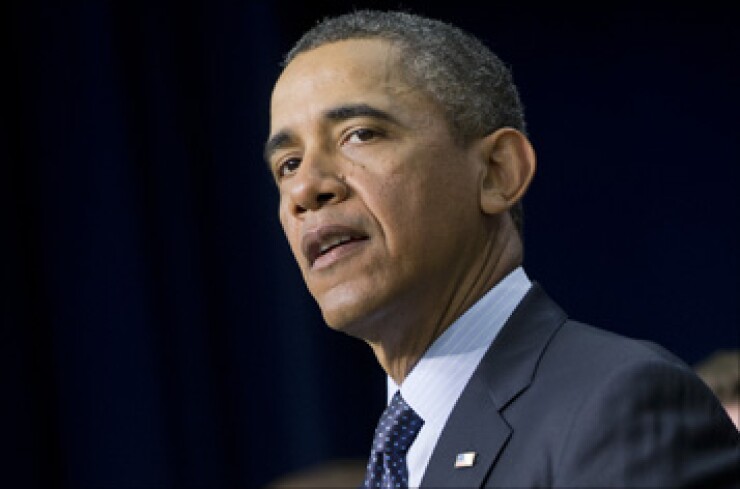
An economic study released Monday by the White House that stresses the value of investments in transportation is the opening round of a week long effort by President Obama to prod Congress to pass a long-term highway funding bill.
"Investments in American transportation infrastructure is not keeping pace with demands and needs of a growing economy," the Council of Economic Advisors and National Economic Council said in the study.
The study comes as House and Senate are expected this week to take up similar but not identical $10.8 billion to keep the Highway Trust Fund functioning over the short term and possibly into mid-2015, but Democrats are continuing to push for passage of a six-year bill before the end of 2014.
The president will beat that same drum on Tuesday, speaking on investments in infrastructure innovations at a highway research center in McLean, Va. On Thursday, he will visit a construction site in Delaware and announce a new program to increase private sector investment in transportation projects, according to the White House.
The competing short-term funding measures were adopted last week by the Senate Finance Committee and the House Ways and Means Committee.
The House committee's Highway and Transportation Funding Act of 2014, HR 5021, stipulates the extension is through May 31, 2015, but the Senate measure, Preserving America's Transit and Highways Act of 2014, does not contain a deadline for the temporary extension of the current two-year highway bill, Moving Ahead for Progress in the 21st Century or MAP-21, which is set to expire Sept. 30.
In an earlier version of his bill, Sen. Ron Wyden, D-Ore., chairman of the Senate Finance Committee, had set a Dec. 31, 2014 cutoff, but he removed the date because it was unacceptable to Rep. Dave Camp, R-Mich., chairman of Ways and Means, and other congressional Republicans.
Adoption of a short-term patch that extends MAP-21 into 2015 dashes hopes a multi-year bipartisan solution to the fund's structural imbalance anytime soon, congressional Democrats and transportation advocates said.
Sen. Tom Carper, D-Del., chairman of the transportation subcommittee of the Senate Environment and Public Works Committee, said Congress should pass the six-year plan before the new Congress convenes in January. If it does not, he warned, a series of short-term extensions can be expected.
"It's not a job for the next Congress, it's the job of the current Congress," Carper said.
"After five years of short-term extensions, punting on our responsibility to get this done for another year will hinder private sector economic growth and job creation, and will likely continue a harmful cycle of short-term extensions indefinitely," he said.
The Senate Environment and Public Works Committee has adopted a six-year measure that would keep highway funding at 2014 levels plus inflation through fiscal 2020.
Wyden said he is "totally committed" to getting a long-term funding bill through Congress this year.
"This is urgent business and inaction is not an option," he said.
Peter Ruane, president of the American Road & Transportation Builders Association, called the short-term extensions "the latest 'punt and leave the stadium' strategy" by Congress.
"Our message to Congress is simple: your job isn't close to being done," Ruane said. "It's incumbent upon lawmakers in the House and Senate, and officials from the Obama Administration to develop a long-term and sustainable HTF solution before the end of 2014."
A short-term extension is worthless without a longer-term solution before the end of the year, said Bob Darbelnet, president of AAA.
"The only way that a short-term patch of the Highway Trust Fund is acceptable is if it buys Congress a few months to work on finalizing a bipartisan, long-term agreement later this year," Darbelnet said.
Rep. Bill Shuster, R-Pa., chairman of the House Transportation and Infrastructure Committee, said earlier this year that the House committee would vote on a long-term highway bill before Congress goes home for the August recess. However, he seems to have backed off that pledge last week after the 10-month extension was adopted by Ways and Means.





